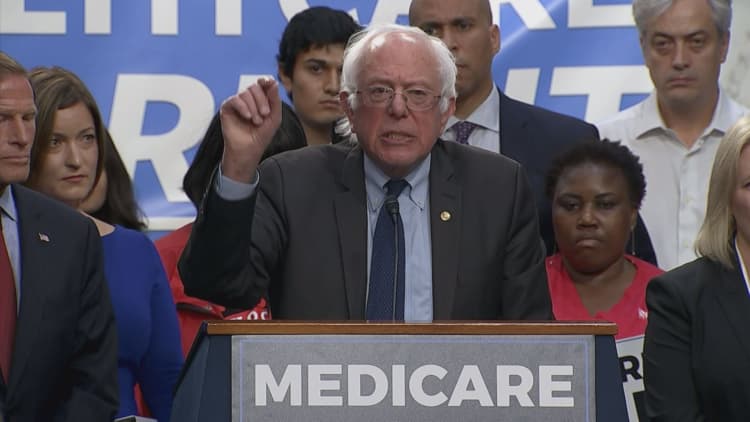
Sen. Bernie Sanders unveiled his single-payer health-care proposal, "Medicare for All," on Wednesday, to a packed room of supporters on Capitol Hill.
The bill already has 16 Democratic co-sponsors, a number that would have been unimaginable just a year ago. The independent senator from Vermont also released a white paper on how the government might finance such a health-care system, which included an income-based tax increase, an expansion of the estate tax, and a new tax on incomes of the 0.1 percent of Americans.
"Today, we begin the long and difficult struggle to end the international disgrace" of U.S. health-care costs, Sanders said, emphasizing that Americans pay more in health-care costs than any other developed nation, nearly 18 percent of U.S. GDP. "The American people want to know what we're going to do to fix a dysfunctional health-care system."
Under a Medicare for All plan, "depending on your income, your taxes may go up," Sander said, "but this will be more than offset" by overall household savings on health-care costs, premiums and copays.
The senator also stressed that a government-managed plan would simplify the financial affairs of both individuals and small- and medium-sized companies. "You will no longer be writing checks to private insurance companies," he said.
"And today we tell the business community that we understand you want to focus on your core mission, not spending countless hours wondering how you're going to cover your employees' health insurance."
Sanders was joined at the podium by a number of high-profile Democrats said to be eyeing potential presidential campaigns in 2020. Among them were Sen. Cory Booker of New Jersey, Sen. Elizabeth Warren of Massachusetts and Sen. Kirsten Gillibrand of New York.
There was also a distinctly campaign-like vibe at the hourlong rollout, with supporters cheering and holding signs. Sanders contributed to the energy, telling the crowd that the launch was the start of a national grass-roots campaign. "Our job now is to take this legislation to every state in the country and hear what the people have to say."
Theatrics aside, Sanders' bill would create a national health insurance program managed by the federal government and modeled on the current Medicare program. Private insurance would still exist to cover elective medical procedures, but would otherwise be phased out as the Medicare for All program was introduced and expanded over a four-year period.
Even before it was launched, Sanders' plan received swift and bitter criticism from Republicans, including White House press secretary Sarah Huckabee Sanders, whose daily briefing overlapped with the senator's event.
Huckabee Sanders called single-payer health-care systems a "horrible" idea, and said, "I can't think of anything worse than having government more involved in your health care."
Republican Sen. Lindsey Graham of South Carolina, unveiling his own health-care plan earlier in the day, declared, "Bernie, this ends your dream of a single-payer health-care system in America."
But polls show that support for single-payer health care is growing in the U.S. According to a recent poll by Kaiser Health News, 53 percent of adults, and one-third of respondents who identified as Republicans, support a single-payer government health-care system.
As long as Republicans control Congress and the White House, Sanders' bill has no chance of becoming law. Nonetheless, it serves as an important benchmark of where the Democratic Party, and Democratic voters, stand going into the 2018 midterm elections and the 2020 presidential contest.


